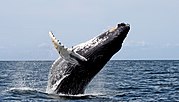 I have been waiting with much anticipation for Animal Planet's new series Whale Wars to start. Last night was the inaugural episode, and I was both delighted, and disappointed. The episode started out promisingly with a confrontation with the Japanese whaling fleet, then quickly became just another reality show, with strife and conflicting personalities among the crew. While these incidents are surely important to the outcome of the mission, I still felt time is being wasted on the people, rather than the whales. Either way, I plan to continue to tune in and watch.
I have been waiting with much anticipation for Animal Planet's new series Whale Wars to start. Last night was the inaugural episode, and I was both delighted, and disappointed. The episode started out promisingly with a confrontation with the Japanese whaling fleet, then quickly became just another reality show, with strife and conflicting personalities among the crew. While these incidents are surely important to the outcome of the mission, I still felt time is being wasted on the people, rather than the whales. Either way, I plan to continue to tune in and watch.Now from reality TV, to actual reality.
In 1982 the International Whaling Commission instituted a moratorium on commercial whaling. Japan fought the ban for several years, then in 1986 withdrew their opposition to commercial whaling...and announced their plans for large scale *scientific* whaling. Under these guidelines they were able to whale within certain limits, conduct their supposed research, and then because it's illegal to waste the meat from whales slaughtered for research, sell the meat on the open market. Smell fishy to anyone else? It certainly does to most anti-whaling advocates. Especially since OUR research shows that most Japanese prefer beef to whale meat these days, and the majority say they rarely if never touch the stuff. It is my understanding that Japan has thousands or more TONS of the stuff frozen and stockpiled on floating refrigerator ships. So why do they keep whaling?

One reason they claim is tradition. Whaling is a tradition in Japan and many other countries such as Russia, Norway, and yes, even here in the United States where certain Eskimo tribes still practice subsistence hunting. But I seriously doubt the Eskimo have an arctic cache full of enough muktuk to feed all of Alaska, while they go out and kill more whales. The Eskimo communities work closely with NOAA (National Oceanic and Atmospheric Administration) to impose sustainable limits - limits that sustain both the bowhead whale population in the Bering Sea, and the Eskimo whaling communities that depend upon the annual harvest.
Another reason Japan might be insisting it be allowed to continue its whaling practices is a desire to thumb their noses at anti-whaling countries. From some of the footage shown on Whale Wars, it seems like the Japanese whalers are treating it all like a big joke, holding up giant plaquards for the GreenPeace and Sea Shepherd helicopters to read that claim they are 'Weighing stomach contents' or 'measuring brain mass' or doing other so-called 'research'. The fact of the matter is, we learn a hell of a lot more from whales when they are still alive and breathing than we do by cutting them up.
Now from the question of Japan's right to whale, to the question of whether the Sea Shepherd oversteps their bounds in trying to stop them. This is where I have trouble forming a good solid opinion. The Sea Shepherd and its crew are the rogues of the Anti-Whaling movement. The flagship (harhar, pun) anti-whaling organization most people think of is GreenPeace. Ironically, the Captain of the Sea Shepherd is one of the founders of GreenPeace, but he was later asked to leave the group. Captain Paul Watson and GreenPeace don't get along, these days. GreenPeace, as the name suggests, is a group who's ultimate goal is a peaceful resolution to the issues they protest. They practice a passive form of protest, following the whaling fleet, taking pictures, holding up signs, and 'bearing witness' as they say to the tragedy of whaling. I have an immense respect for GreenPeace. But I have to agree with Captain Paul Watson when he said "You don't just stand by and watch while someone kicks a puppy."
The line between the Sea Shepherd's aggressive form of protest and eco-terrorism is thin. I think the question that would define it better is whether or not Japan really IS breaking international law by whaling in the southern waters. Personally, I think they are. I think they cleverly dodged the bullet, and would love to wag their behinds and say 'nany nany boo boo' to us. They're kicking the puppy and just daring someone to do something about it, and I, for one, am the type of person who would kick back. But the line is thin, my friends, and crossing that line will do more harm to our cause than good. Chain yourself to trees if you must, but don't blow up the loggers.
My thoughts will be with the Sea Shepherd and her crew, as I watch the rest of the season unfold.


No comments:
Post a Comment